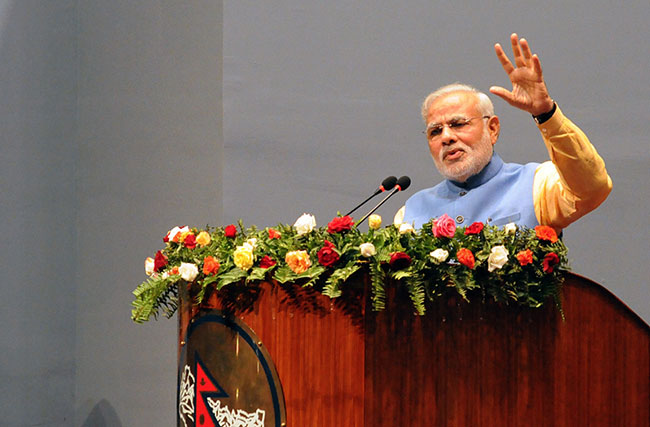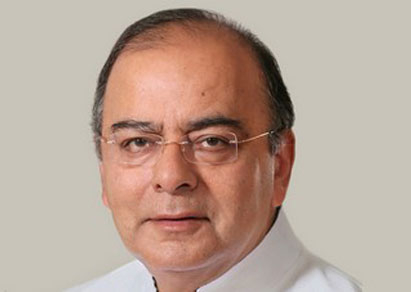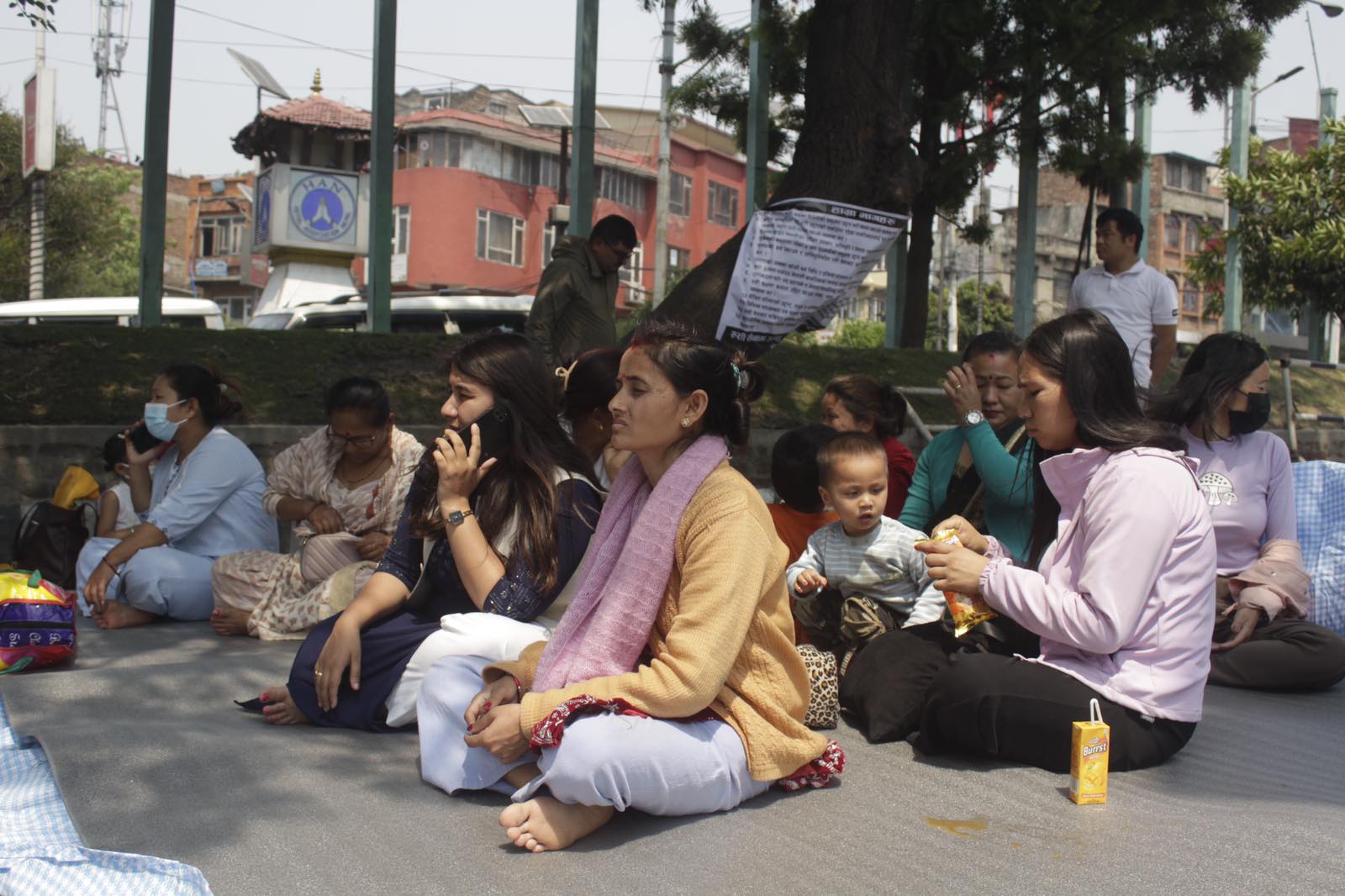
OR
Prime Minister Sher Bahadur Deuba must do more than just tick the box that India was the first country he visited on assuming office. He must modernize Nepal’s approach to India.
This 15th August, India celebrated its 70th Independence Day. Addressing the country from Red Fort, as Indian Prime Ministers always do on Independence Day, Prime Minister Narenda Modi noted that it was a special day.
“This is a special year—75th anniversary of Quit India, 100th anniversary of Champaran Satyagarah, 125th anniversary of Ganesh Utsav,” he said.
But his speech wasn’t devoted to looking back. Instead, he was looking forward and described a “New India” that was taking shape. As India barrels towards a new era, Nepal’s outlook on India remains firmly glued to the past.
The image of Madhesi leaders subserviently sitting around Lalu Prasad Yadav reverberated around social media like an echo on the hills of Mustang. Prime Minister Modi’s maiden speech in our parliament was widely acclaimed, particularly as he began in Nepali.
Then, the horrors of the blockade; the national fury when Nepalis were told Buddha was not born in Nepal and the subsequent national celebration when Prime Minister Modi acknowledged Buddha was born in Nepal; the flooding of Nepali territories allegedly due to India-built dams. These are just a sampling of the contemporary images that define our perceptions of India. There are many more.

Old mindset
It isn’t that these images are shaping our perception of India. Rather our reactions to these images and events reflect a view of India that is misguided and antiquated.
The way we interpret our politics is deeply shaped by our perceptions about India. Political leaders are categorized as being either pro- or anti-India. Events are assessed on whether India wanted it that way or not. If good things happen, then India apparently wished for that to happen. If bad things happen, like the blockade for instance, then Nepal apparently didn’t do as India commanded.
Nepali politicians have blanket license to pin every decision on the influence that India reportedly exerts. Their justification works only because we believe the story about India’s influence on Nepali politics, government and society.
Just as Prime Minister Modi wants to shape a New India, Nepal must adopt a foreign policy approach towards India that is consistent with a New India.
We must recast our relationship with India as partners instead of imagining ourselves as being in patron-beneficiary relationship. This is not a rejection of India as a growing global power but rather for us to have better appreciation of India as it is today. To modernize its relationship with India, Nepal needs to empathize with India.
The biggest shortcoming in Nepal’s approach to India, both at the government and public level, is that we have no empathy. We see India as a big global power whose actions have a direct bearing on our wellbeing. This describes a relationship of dependence, as between a patron and a beneficiary. To be partners in a relationship, we must be able to empathize with India.
Role model
There is little doubt that India is an emerging global power. It is already one of the fastest growing economies in the world. If it stays the course, it is positioned to be one of the top three economies within the next two decades. It has global aspirations—a permanent seat at the UN Security Council, its recognition as a regional super power and influence on global affairs.
But India is also not without its challenges. If its largest external campaign is for a permanent seat at the UN Security Council, its largest domestic campaign is to get its citizens to use toilets. Approximately 200 million people live below the poverty line. Half the population lives right around the poverty line, such that if the poverty line were increased just a bit, it would bring half the populations under it.
In addition to poverty and deep-rooted social exclusion, India faces multiple challenges on security, scarcity of natural resources (particularly water), and geo-political and climatic vulnerabilities.
We need India to succeed. Not merely because it will benefit us (which it will) but because we need to see a country that overcomes its poverty, its deep-rooted social exclusion, its poor governance and weak institutions, all within a democratic framework.
A stronger and prosperous India that is offering global leadership is in our best interest. For that, we need to stop thinking about India in terms of how we can feed off it, as if it were a patron, but rather work with it as a partner.
Beyond government
India-Nepal relationship always appears to hinge on personal rapport between a few individuals. In the past, it was personal ties between the leadership of the Congress party in India and Nepali royalty. Now the relationships are governed by more complex factors.
There are relationships between political leadership, between bureaucracies, between institutions and between the public. It is not clear that these relationships are all aligned on what they want to achieve. An initiative often falls apart because someone somewhere in government or bureaucracy simply had an axe to grind.
To modernize Nepal’s approach to India, she must seek to move the basis of relationship away from government. The center of gravity of the relationship must move from government to something beyond, perhaps to the deeper fundamental socio-economic ties that bind the two countries.
One of India’s biggest achievements in the past two decades has been the liberalization of its markets and its emphasis on rule-based law. Indian markets have matured significantly across many sectors. The markets are now much deeper, diverse and accommodate a wide range of national and international transactions. The growth of Indian markets, in many cases, has been enabled by a credible rules-based system.
Today’s India’s market-based economy is robust, sound, open, credible and rule-based.
Nepal now has an opportunity to shift its relationship away from a government-to-government basis and to utilize India’s marketplace more effectively. Across the sectors—for example, energy, health, education, transport, trade—Nepal must connect more directly with the Indian market place utilizing deregulation that is already in place instead of relying on the traditional methods of having the two governments talk to each other.
Outdated equidistance
Almost all Nepali political leaders state that Nepal should maintain an equidistant policy between India and China. No one understands what this means. India and China are not exactly suitors that Nepal should somehow maintain an equal distance between them.
The idea of equidistance originates only because we presume a patron-beneficiary relationship—we want to make sure that we keep both our patrons happy simultaneously so that we continue being a beneficiary to them both.
As partners to both India and China, the idea of equidistance is meaningless. We should reach out to whoever we want, whenever we want and on our terms. But for this, we have to be clear on what we want from our partners in the first place.
Perhaps Prime Minister Deuba has an idea of what he wants from India during his forthcoming visit later this week.
bishal_thapa@hotmail.com
You May Like This

Held Indian police team handed to Indian authority
BHIMDATTANAGAR (Kanchanpur), June 2: An Indian police team which was taken under control for arresting and transporting a Nepali national... Read More...

Indian FM Jaitley says Nepal will get exchange facilities for demonetized Indian notes
KATHMANDU, March 3: Indian Minister for Finance Arun Jaitley said that Nepal would get exchange facilities for the demonetized Indian... Read More...

Indian army ex-chief could be new Indian envoy to Nepal
KATHMANDU, Jan 5: India is likely to appoint its former Army Chief Dalbir Singh Suhag as its new ambassador to... Read More...

Just In
- Sajha Yatayat cancels CEO appointment process for lack of candidates
- Govt padlocks Nepal Scouts’ property illegally occupied by NC lawmaker Deepak Khadka
- FWEAN meets with President Paudel to solicit support for women entrepreneurship
- Koshi provincial assembly passes resolution motion calling for special session by majority votes
- Court extends detention of Dipesh Pun after his failure to submit bail amount
- G Motors unveils Skywell Premium Luxury EV SUV with 620 km range
- Speaker Ghimire administers oath of office and Secrecy to JSP lawmaker Khan
- In Pictures: Families of Nepalis in Russian Army begin hunger strike
















_20240419161455.jpg)

Leave A Comment